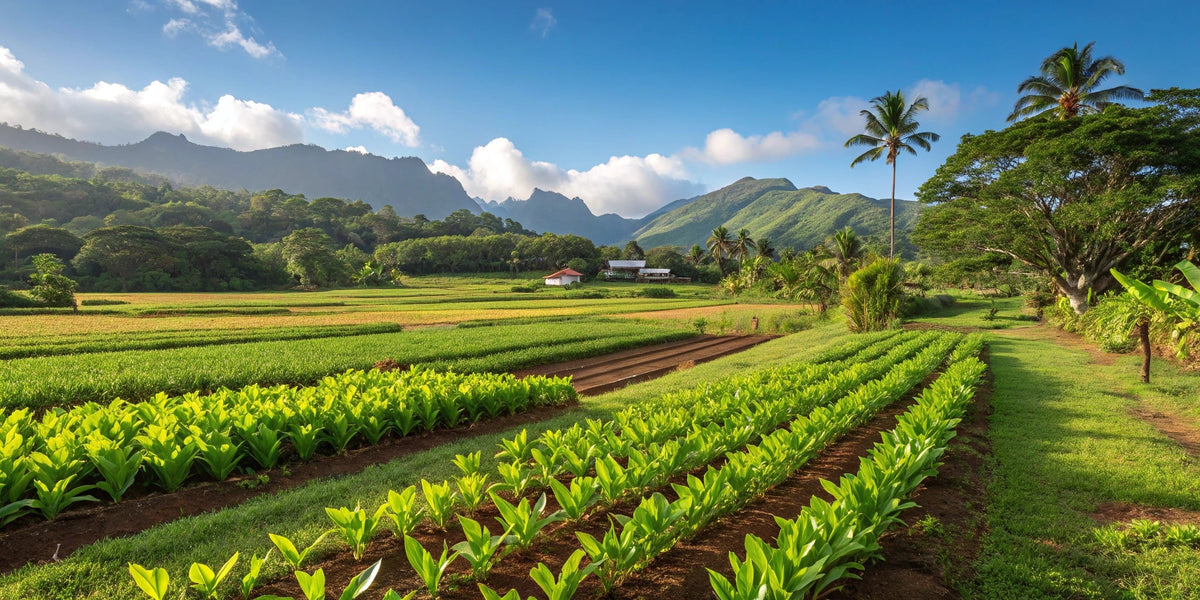
Regenerative Farming vs Conventional: The Story Behind Our Red Hawaiian Turmeric
|
|
Time to read 4 min
|
|
Time to read 4 min
Key Points:
At Elixir Shots, we're passionate about creating wellness products that are not only good for you, but good for the planet too. That's why we grow our Red Hawaiian Turmeric using regenerative organic farming practices.
But what exactly is regenerative farming, and how does it differ from conventional methods?
In this post, we'll explore the key differences and share why we believe regenerative agriculture is the future of farming.
Regenerative farming is a holistic approach to agriculture that aims to improve soil health, increase biodiversity, and sequester carbon from the atmosphere.
Rather than simply sustaining current resources, regenerative practices actively work to regenerate and enhance the ecosystem.
Some key principles of regenerative farming include:
The end goal of regenerative farming is to create a closed-loop system where the farm operates in harmony with nature, rather than depleting or damaging natural resources.
In contrast, conventional farming often takes a more industrialized, monocrop approach that can lead to soil degradation, biodiversity loss, and other environmental issues over time.
Some common practices in conventional farming include:
While conventional farming has allowed for increased efficiency and yields in the short term, many argue that it is not sustainable in the long run due to its negative environmental impacts and reliance on finite resources like fossil fuels.
At Elixir Shots, we believe that the way our ingredients are grown matters just as much as the ingredients themselves. That's why we use our regenerative organic family farm in Kauai, Hawaii to source our vibrant Red Hawaiian Turmeric.
Our turmeric is grown in nutrient-rich volcanic soil using regenerative practices like crop rotation, cover cropping, and composting. No synthetic pesticides or fertilizers are used - instead, the farm relies on natural methods like beneficial insects and locally-sourced organic fertilizers to support healthy plant growth.
By growing our turmeric this way, we're not only ensuring a high-quality, clean ingredient for our wellness shots - we're also supporting a farming system that actively improves the health of the soil, sequesters carbon, and promotes biodiversity.
Some specific benefits of regenerative turmeric farming include:
In other words, regenerative farming allows us to grow the highest-quality turmeric in a way that gives back to the earth, rather than depleting it.
We believe this is the way farming should be - for the health of people and the planet.
One of the most powerful ways you can support regenerative farming is with your purchasing choices.
By choosing products from brands that prioritize regenerative ingredients (like our delicious Immunity Shots!), you're voting with your dollars for a more sustainable and resilient food system.
Other ways to get involved include:
Every action matters when it comes to building a better food future. By working together and making conscious choices, we can all be part of the regenerative agriculture movement.
At Elixir Shots, our commitment to regenerative organic farming is about more than just buzzwords - it's a reflection of our core values and our vision for a healthier world.
We believe that the path forward is one where farming works in harmony with nature, not against it. Where healthy soil grows healthy plants, which in turn nourish healthy people. Where agriculture is a solution to climate change, not a contributor.
Regenerative farming is not just a nice-to-have - it's a necessity if we want to build a truly sustainable and resilient food system for generations to come. And we're proud to be part of this growing movement, one vibrant shot of Red Hawaiian Turmeric at a time.
We hope this post has shed some light on the importance of regenerative agriculture and inspired you to get involved in whatever way you can.
Together, we can grow a better future from the ground up!


